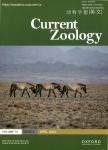The importance of trans-generational effects in Lepidoptera
The importance of trans-generational effects in Lepidoptera作者机构:Metapopulation Research Centre Department of Biosciences University of Helsinki Finland
出 版 物:《Current Zoology》 (动物学报(英文版))
年 卷 期:2016年第62卷第5期
页 面:489-499页
核心收录:
学科分类:0710[理学-生物学] 07[理学] 09[农学]
基 金:supported by funding from the Academy of Finland the European Research Council (Independent Starting grant META-STRESS to MS
主 题:butterfly maternal effect moth offspring quality paternal effect plasticity.
摘 要:The importance of trans-generational effects in shaping an individuals' phenotype and fitness, and consequently even impacting population dynamics is increasingly apparent. Most of the research on trans-generational effects still focuses on plants, mammals, and birds. In the past few years, however, increasing number of studies, especially on maternal effects, have highlighted their im- portance also in many insect systems. Lepidoptera, specifically butterflies, have been used as model systems for studying the role of phenotypic plasticity within generations. As ectotherms, they are highly sensitive to environmental variation, and indeed many butterflies show adaptive phenotypic plasticity in response to environmental conditions. Here, we synthesize what is known about trans-generational effects in Lepidoptera, compile evidence for different environmental cues that are important drivers of trans-generational effects, and point out which offspring traits are mainly impacted. Finally, we emphasize directions for future research that are needed for better understanding of the adaptive nature of trans-generational effects in Lepidoptera in particular, but potentially also in other organisms.



